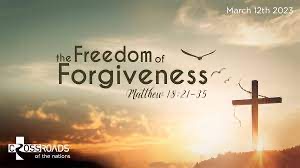Forgiveness 2.0
This is the sermon I preached on Sunday, Sept. 17 at St. Timothy Lutheran Church. The text was Matthew 18:21-35.
Last week’s gospel was about forgiveness, and I’m calling this week’s Forgiveness 2.0. Jesus focused last week on individual relationships and this week, he highlights forgiveness and the community of faith, beginning with fellow believers.
When Peter asks Jesus if seven times were enough to forgive a repeat offender who asks for mercy, he thought that was an incredibly large number. For the Jewish people of Jesus’ day, three was considered the most that forgiveness should be sought. Peter was being quite expansive with seven. How does Jesus respond? Seventy times seven! Yikes! That’s a new way to look at forgiveness in relationships.
Jesus tells a parable about what forgiveness looks like in the kingdom of God. In some ways, the king can be a picture of God. The first issue dealt with is the erasure of debt (v. 27). The slave had incurred an incredible amount of debt, around twenty years of salary for a day laborer, more than is possible to accrue in several lifetimes.
The king mercifully responds to the slave's pleas and forgives him everything. He’s free and clear. How do we think the slave would respond to that? Will he be moved to pay it forward? There is the expectation that the slave will have a response of mercy toward others. He had dodged quite a bullet and must have felt fairly light-hearted.
However, the slave is not recognizing the role of the king’s grace and forgiveness in his life. It should affect how his daily life is lived. He was owed such a small amount compared to how much he was forgiven. The debt-free slave refuses “mercy,” that is, to pay his debts of interpersonal obligation to an equal (Bruce J. Malina & Richard L. Rohrbaugh, Social-Science Commentary on the Synoptic Gospels).
The slave’s ruthlessness was observed by the other slaves, and the king lowered the boom. Jesus ends the parable with these words, “And that’s exactly what my Father in heaven is going to do to each one of you who doesn’t forgive unconditionally anyone who asks for mercy” (v. 35). What are we to make of these words? Sounds like hellfire, doesn’t it? “The viciousness of the Lord’s response in the parable is now attributed to how God reacts when we, who are forgiven much, do not forgive another” (D. Mark Davis, leftbehindandlovingit.blogspot.com).
What do we pray for together every Sunday? “Forgive us our trespasses as we forgive those who trespass against us.” “Forgive us our debts.” That is at the heart of the kind of forgiveness God requires of us. According to Martin Luther’s Small Catechism:
We ask in this prayer that our heavenly Father would not regard our sins nor deny these petitions on their account, for we are worthy of nothing for which we ask, nor have we earned it. Instead, we ask that God would give us all things by grace, for we daily sin much and indeed deserve only punishment. So, on the other hand, we, too, truly want to forgive heartily and to do good gladly to those who sin against us.
We cry out for mercy to our all-merciful God. If we let him, his essence of mercy and love will work through us.
Have you been wondering why this bottle of glue is here on the pulpit? It’s a visual reminder for us. Forgiveness is the glue that holds last week’s and this week’s passages together. We have all these teachings of Jesus in today’s gospel. Jesus is showing us his mercy and forgiveness. Everything in last week’s and this week’s gospels revolves around forgiveness. It is what holds our families together, our church, all of God’s church together.
Yes, we know it’s by God’s grace that we are saved and made the people of God. But as a community of faith, how do we demonstrate in our lives together what God has done? God is endlessly merciful and forgiving, but are we? We all have people in our lives that we struggle to forgive. However, “Forgiveness is not an excuse for unjust behavior, and to forgive is not necessarily to forget.… Some events and situations we should not forget: the Holocaust, slavery, ethnic cleansing, exploitation of children and women, mistreatment of Native peoples, the infidelity of a spouse, a lie told that turned your life upside down, abuse, or betrayal” (Charlotte Dudley Cleghorn, Feasting On the Word: Year A, Volume 4).
As I read more and more about the war between Ukraine and Russia, I can’t help but wonder how it affects God’s people and God’s peace in their lives. There are faithful, believing Christians in Russia who decry the awful war. There are faithful, believing Christians in Ukraine. Many are even of the same denomination. We can pray for them to lean on God, so they can forgive each other.
Let’s be honest. We all say and do things that hurt others. It’s the sinner part of our saint/sinner nature. It is forgiving each other that will prevent us from exploding, that will cause us to grow together in love, and that will reach out to people around us. God has forgiven us so that we exercise mercy and forgive others. I like the way Charles Cousar summarizes this. “To be forgiven means to give up the power game of playing innocent versus guilty and to join a fellowship of forgiven sinners” (Texts for Preaching: A Lectionary Commentary Based on the NRSV—Year A). We are all forgiven and all sinners—and saints! Welcome to the fellowship.
Amen.



Comments